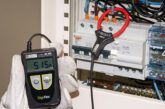
Steve Martin, ECA’s Head of Specialist Groups, talks us through some of the steps they have come up with to help ensure electrical contractors do their research properly before purchasing electrical testing equipment.
Commercial clients increasingly expect electrical contractors to be able to test a wide variety of systems and products. As a result,contractors with the relevant skills knowledge and experience have a distinct advantage. However when it comes to commissioning, maintaining and certification, making the right choices over which test equipment to buy, with such a wide range of equipment to choose from, can be confusing.
In addition, manufacturers are frequently producing updates and developing new testing products across a range of areas, including electrical, datacomms, fire and emergency systems.
To help ensure you can do your research correctly, and keep up to speed with technological developments, the ECA has prepared a quick guide to the steps to take before making a purchase.
1) Be realistic about your requirements and capabilities
It’s easy to over specify, or be over specified to! When dealing with manufacturers, ensure your requirements are realistic for what you aim to do, and only make an investment that you can afford. Manufacturers tend to offer products to fit within all budgets, but will invariably be targeting customers with new, hi-spec products.
2) Consider all-inclusive test kits
These testing kits are growing in popularity, and typically include as a minimum, a tester, results recording software, test leads and accessories. A kit must also be robust and able to handle being used in everyday environments, such as construction sites and the back of a van!
3) High quality software is key
When it comes to providing test results, high quality software is vital. Many manufacturers, as standard, build in test data storing facilities which enables you to download your tester onto certification software saving both time and money. Selecting the appropriate software which matches your business model and clients expectations is key.
4) Warranties and support are important
The warranty that comes with a product is an important sign of the confidence that a manufacturer places in its products. Furthermore, check that technical support is available throughout the product’s lifespan, giving you peace of mind that you haven’t just bought kit, you’ve bought support.
5) Remember continued accuracy and calibration
Calibration shows whether equipment is measuring correctly. It’s essential for electrical testing, and ensures the product is meeting its published performance specification. However, the means of continued accuracy and calibration can differ from one type of equipment to another with different costs.
6) Keep up to speed with relevant standards
New standards for safer installations are an ongoing development. Monitor any changes through reputable industry bodies like the ECA, and ask for guidance where you need help interpreting what new rules mean in practice.
7) Consider new opportunities
There are many opportunities for electrical contractors to diversify into new technologies – which means new ways for your business to grow. Consider opportunities like fire, emergency and security systems or areas such as datacomms as ways to grow your portfolio and add value to clients. Another popular area is portable appliance testing (PAT), and there is now a range of low-cost testers to meet this requirement.
8) Transmission testers are useful
When working on datacentre and IT infrastructure projects, utilise transmission testers as an effective mechanism for avoiding cable and connection issues, which can result in unnecessary costs down the line in repair work.
With manufacturers set on providing electrical contractors with more features on products, and with an increasing number of contractors becoming more and more tech-savvy, this direction of travel is unlikely to change.
But if you – as an electrical contractor – come prepared to any system product testing, and ask the right questions during purchasing, you can ensure your money is spent wisely, and minimise the risk of performance and service issues arising down the line. Ultimately, the right electrical testing equipment and technical support will help you to run an efficient and high quality testing regime for your clients.








